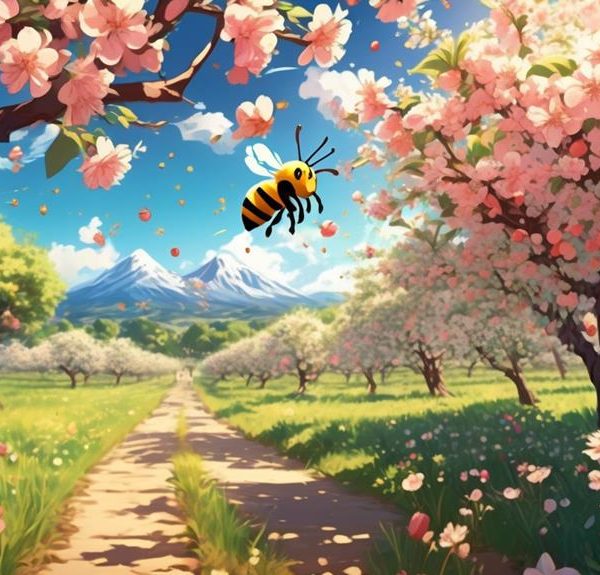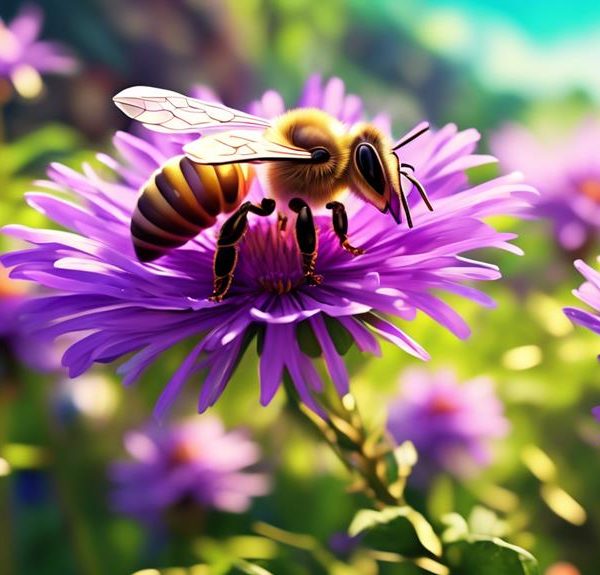Learn about the intricate relationship between bees and ash tree pollen, a tale filled with surprises and implications for the natural world.
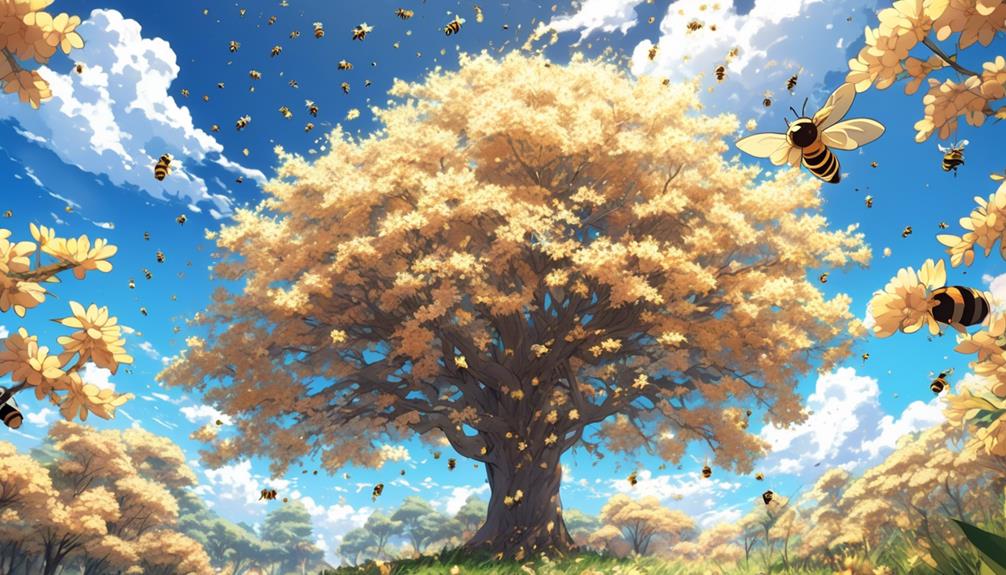
Do Bees Like Ash Tree Pollen
Imagine you're strolling through a lush forest in early spring, the air rich with the scent of budding ash trees. You might notice bees buzzing around, seemingly drawn to the newly sprouted pollen.
But do bees genuinely like ash tree pollen, or are they there for some other reason? The relationship between bees and ash tree pollen is an intriguing one, riddled with nuances and potential implications for both bee and forest health.
As we explore this relationship further, you'll find that the answer may not be as straightforward as you'd expect.
Key Takeaways
- Bees are not initially attracted to ash tree pollen but will visit ash trees as a fallback option when preferred plants are scarce.
- Ash tree pollen provides essential nutrients for bees when other food sources are limited.
- Scientific studies suggest that bees, especially honey bees, have a preference for ash pollen due to its high protein content.
- The impact of ash pollen on bee health can be both positive (nutritional benefits) and negative (potential for carrying harmful microorganisms or pesticides).
Understanding Bee Pollination Preferences
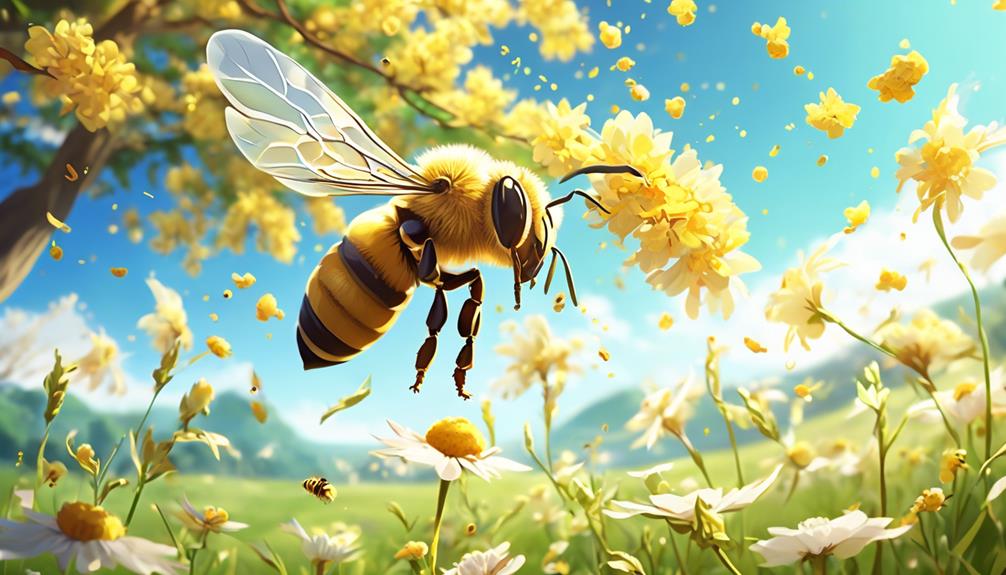
To fully comprehend bee pollination preferences, it's imperative to delve into their interactions with various plant species, such as the ash tree, and understand the specific factors that influence these choices. You see, bees don't simply flit from flower to flower indiscriminately. They're driven by particular needs and environmental stimuli that determine their selection.
Primarily, bees are attracted to the nectar and pollen of plants. However, the ash tree isn't their first preference, and here's why. Ash trees are wind-pollinated, meaning they don't produce the nectar that bees are seeking. Additionally, the pollen grains of ash trees are comparatively larger and less nutrient-dense, making them less appealing to bees.
Yet, bees will visit ash trees under certain conditions. When there's a scarcity of preferable plants, or if the ash tree is in close proximity to the hive, bees will collect its pollen. Similarly, bees with less foraging experience might also visit ash trees more frequently.
The Role of Ash Trees in Bee Pollination
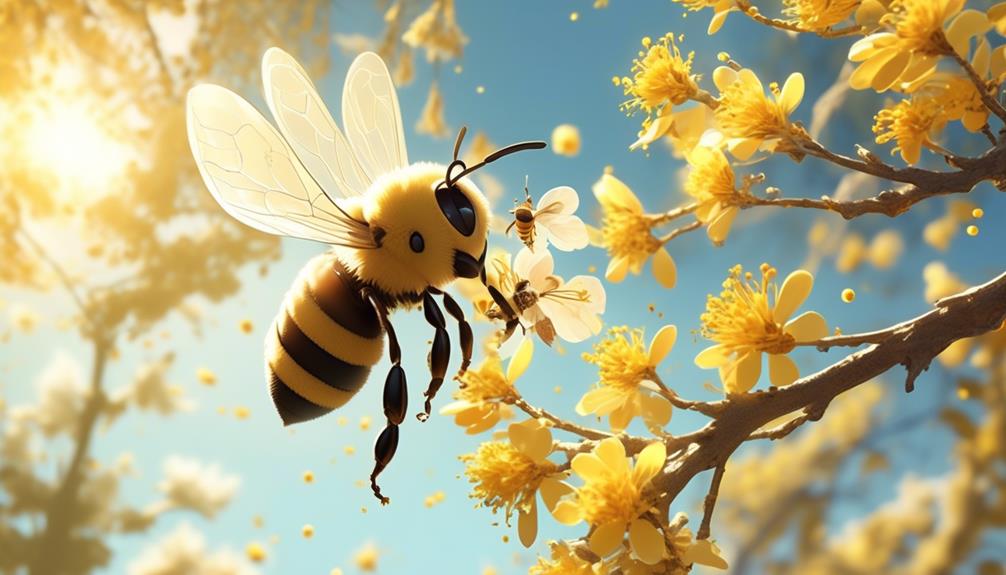
Despite not being a top choice for bees, ash trees play an intriguing role in bee pollination, particularly when other nectar-rich plant options are scarce. While these trees aren't the bees' first choice, they're often a fallback option.
Their pollen, though not as rich in nectar, provides essential nutrients when other food sources are not available. They help sustain bee populations during certain times of the year, making them critical for bee survival.
Consider the table below that provides further insights:
Ash Tree Characteristics | Role in Bee Pollination |
|---|---|
Pollen Quality | Provides essential nutrients |
Blooming Period | Offers pollen when other sources are scarce |
Tree Density | High density means more readily available pollen |
Nectar Availability | Less nectar, but sufficient for survival |
Pollen Accessibility | Easily accessible pollen due to tree structure |
Scientific Studies on Bees and Ash Pollen
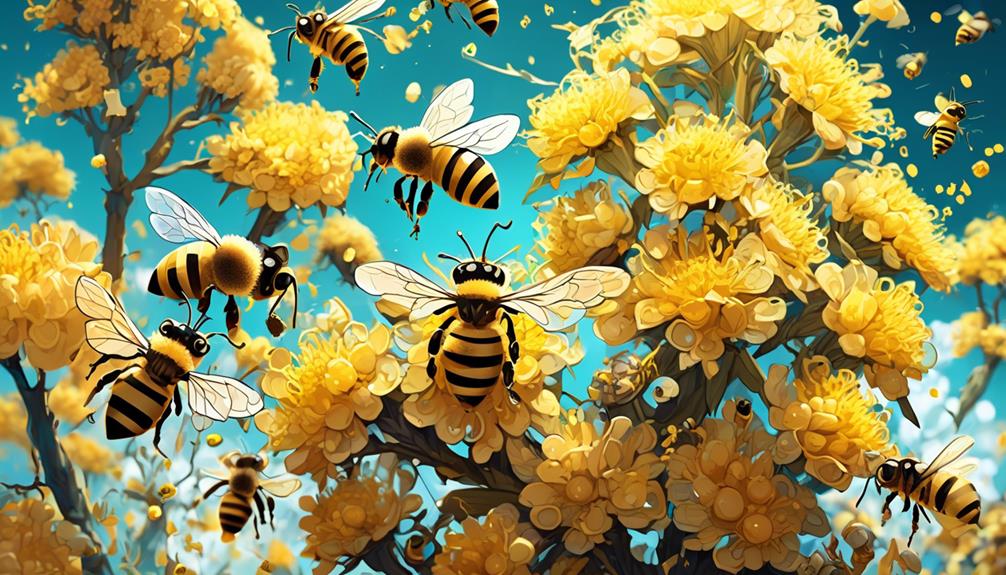
Building on the role of ash trees in bee pollination, let's explore the scientific research conducted on bees and ash pollen.
Scientists have conducted extensive research to understand how bees interact with ash pollen. You might be surprised to learn that bees, particularly honey bees, indeed have a preference for ash pollen.
In a study published in the Journal of Apicultural Research, scientists found that ash pollen contains a high concentration of proteins, which are essential for the bees' growth and development. This protein-rich pollen, thus, provides a highly nutritious food source for bees, enhancing their survival and reproduction rates.
Another study, published in the Journal of Insect Behavior, showed that honey bees exhibit a strong preference for ash flowers over other types of flowers. The bees were observed to spend more time and energy foraging on ash trees, indicating their preference.
However, it's important to remember that these studies are based on observations and controlled experiments. Factors such as the bees' foraging habits and the availability of other food sources can significantly influence their preference for ash pollen. So, while these studies suggest that bees like ash pollen, more research is needed to fully understand this relationship.
Impact of Ash Pollen on Bee Health
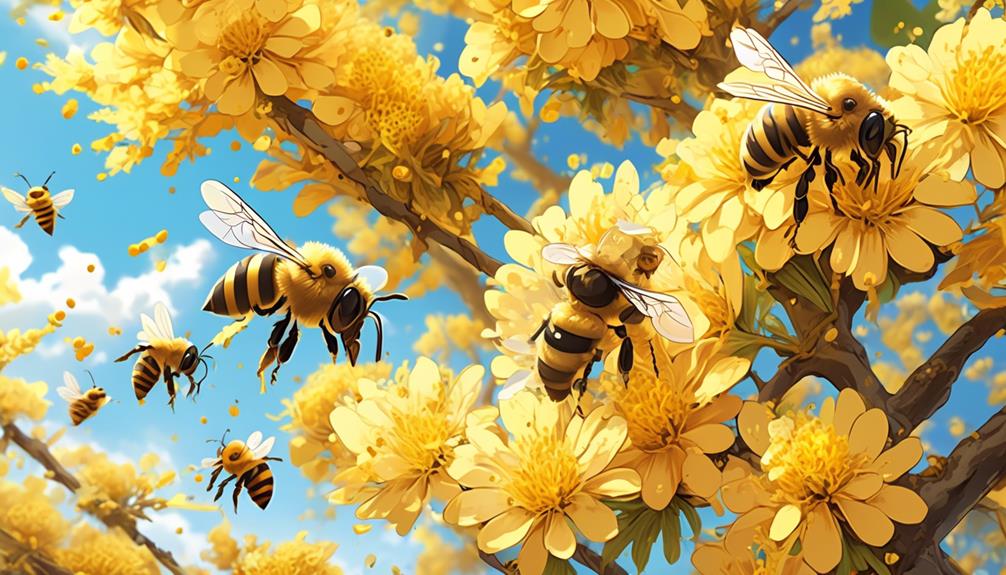
Delving into the impact of ash pollen on bee health, it's crucial to understand that this protein-rich food source doesn't just affect the bees' feeding preferences, but also has significant implications for their overall wellbeing and survival.
Ash tree pollen, with its high protein content, helps bees to develop and grow. It contains essential amino acids that bees need to thrive. However, it's not all positive. Just as how you can be affected by different types of food, bees also respond differently to various pollen types. Some pollens, including ash tree pollen, can carry harmful microorganisms or pesticides that could detrimentally affect bee health.
Moreover, bees that are exposed to only one type of pollen, such as ash, may suffer from nutritional deficiencies. This is because no single pollen type includes all the nutrients that bees require. Therefore, it's akin to you eating only one type of food – your health would inevitably decline over time.
Promoting Bee-Friendly Landscapes With Ash Trees
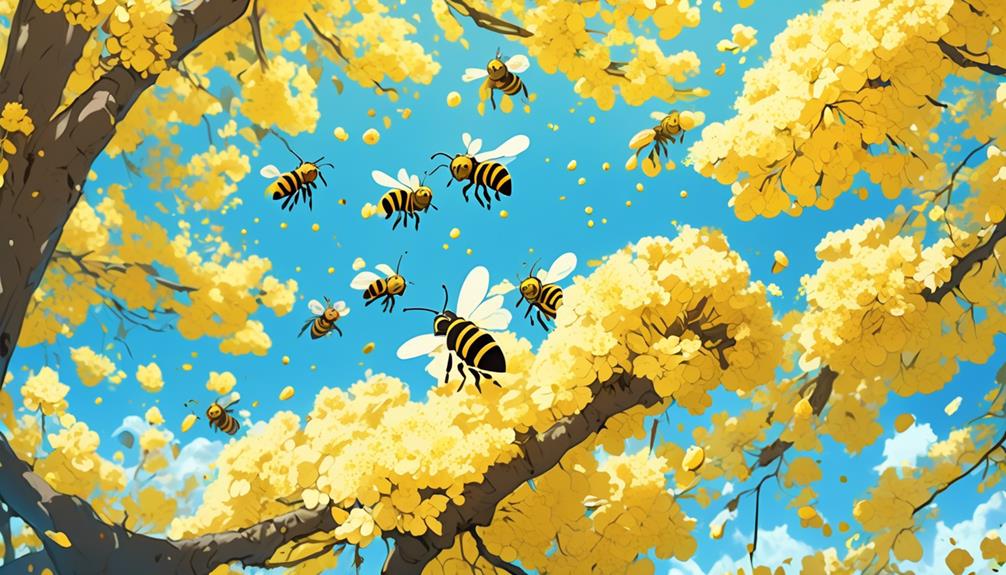
Recognizing these challenges, it's crucial to consider the role of ash trees in creating bee-friendly landscapes, particularly given their production of pollen that bees can utilize, albeit with noted health implications. Understanding the delicate balance between the bees' need for pollen and potential risks can help you foster a landscape that promotes their survival and health.
Firstly, you must ensure ash trees are adequately spaced to facilitate bee foraging. This spacing reduces overexposure to ash pollen, mitigating potential health risks. When planting, it's essential to intersperse ash trees with other bee-friendly plants. This variety offers bees alternative pollen sources, further reducing their reliance on ash pollen.
Secondly, remember that proper tree care is integral. Regular pruning encourages healthy growth, while pest control minimizes harmful infestations which could affect bees.
Lastly, limit the use of pesticides. These chemicals can be highly detrimental to bee populations.
Frequently Asked Questions
What Other Types of Pollen Do Bees Generally Prefer Apart From Ash Tree Pollen?
You're curious about the preferences of bees for different types of pollen. They're not picky and are known to gather pollen from a variety of plants. However, they show a particular fondness for pollen from plants like clover, dandelions, and various fruit trees.
The protein content, size, and shape of the pollen grains can influence their choice. But remember, availability and proximity of the pollen source also play significant roles in their preference.
Are There Specific Types of Ash Trees That Bees Are More Attracted to for Pollination?
Absolutely, bees do show preferences among ash tree species. They're often more attracted to those bearing more abundant and accessible pollen. For instance, species like the White Ash or Green Ash are favorites. You'll find bees flocking to these trees during flowering season.
However, it's essential to note that bee preferences can vary depending on their species, local flora, and availability of other pollen sources.
How Does the Ash Tree Pollen Compare to Other Types of Pollen in Terms of Nutritional Value for Bees?
You're inquiring about the nutritional value of ash tree pollen for bees.
While it isn't their top choice, bees do collect ash tree pollen. However, it's not as nutritionally dense as some other pollen types.
For instance, clover and sunflower pollen are higher in protein, essential for bee growth and development.
Does the Presence of Ash Trees in a Landscape Increase the Overall Bee Population?
Yes, having ash trees in a landscape can boost the bee population. Ash tree pollen offers valuable nutrients for bees, helping their colonies thrive. They're particularly drawn to the ash tree's abundant pollen supply during spring.
Are There Any Negative Effects on the Environment Due to Bees' Pollination of Ash Trees?
You're interested in the environmental effects of bees pollinating ash trees. There's no evidence indicating any negative impact.
On the contrary, bees' interaction with ash trees is beneficial. Bee pollination aids in the reproduction of ash trees, contributing to biodiversity.
It's also worth noting that bees gain nutrition from ash tree pollen, which supports the bee population. Thus, this symbiotic relationship enhances the health of both the bees and the ecosystem.
Conclusion
So, do bees like ash tree pollen? Indeed, they do.
Studies show that bees are drawn to ash trees, utilizing the abundant pollen for their nutritional needs. This interaction plays a crucial role in both bee health and ash tree pollination.
By integrating ash trees into your landscape, you're not only promoting a bee-friendly environment but also contributing to the vitality of these remarkable creatures.
Remember, every ash tree planted is a step towards supporting our essential bee populations.

